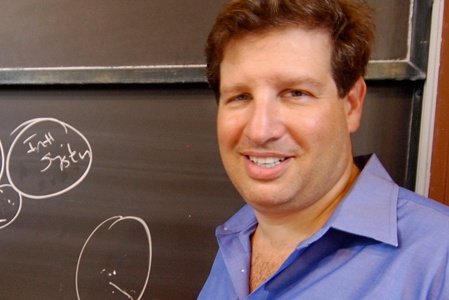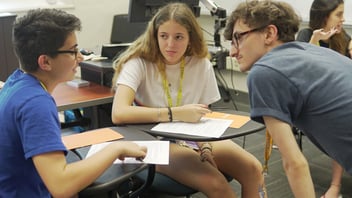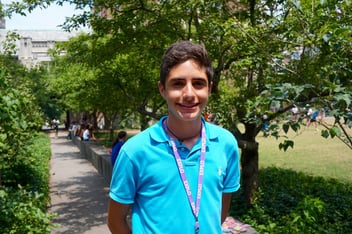Gideon Rose: International Editor

Gideon Rose [Explo at Yale Student ’79], editor of Foreign Affairs, returns to Exploration to talk politics.
On a bright, hot day in July, Gideon Rose [Explo at Yale Student ’79] stands on the steps outside Yale University’s Sterling Hall. Dressed in a blue button-down shirt and charcoal slacks, Rose has just come from the Ivy League lecture hall, where as a featured presenter for the Explo at Yale's Speaker Series; he talked with students about his specialty: international policy.
On the steps, he talks with a small group, discussing his mentors in the field, his friends, his passions, and how he got his start. He looks at his watch. “Oh my gosh,” he says. “I need to get going if I’m going to catch my train back to the city.” For the past eight years, Rose has been the managing editor of Foreign Affairs, a bi-monthly magazine recognized for its singular expertise on matters of international relations. Rose assumed the position in 2000, replacing his friend, the noted political journalist Fareed Zakaria. Before coming to the magazine, he taught at Princeton and Columbia, and worked on the National Security Council for the Clinton Administration. "We're trying to think rigorously about the great problems of the world today," Rose says about his work at the magazine. "If, as an editor, you have the humility to be largely behind the scenes, then it's a wonderful job."
Standing at the front of Sterling Hall, Rose’s speech to the Exploration students was a short one. With an audience of about 150 students, Rose introduced himself with a few words. He spoke briefly about his past work and then about the dynamics and routines of his current position. Less than ten minutes after he had begun, Rose finished his speech. Instead of talking more, Rose said that he wanted to open up the floor to the crowd of students, inviting them to ask questions about today's prominent political issues. And so the discussion began. And for the next hour and fifteen minutes, Rose fielded queries from students and debated a range of topics – nuclear weapons in North Korea, genocide in Darfur, job loss in America, and the ramifications of China's growing economy, among many others.
When Rose spoke, he donned the journalistic cap in favor of the editorialist’s, offering insights that were less his own opinions and more a coherent synthesis of the thinking being done on these issues by the world's leading policy experts. On and on, Rose and Explo students talked about some of the world's most urgent issues. When the event concluded, students came forward to talk to Rose individually. Gathered at the foot of the stage, some asked follow-up questions, others posed topics that hadn’t been touched on, and others simply thanked Rose and told him how much they enjoyed hearing him talk. I never would have imagined myself fascinated by foreign policy issues,” said Emma Messore, an eleventh grade student in attendance. “Sitting in the audience, I realized that I was discovering a new interest.”
Afterward, while walking from the lecture hall to catch his train back to New York City, Rose said that he enjoys his place in the middle ground of today’s political discussion: close enough to know the central players and points, but with enough distance to keep an eye on all the major issues. Any closer and he would sacrifice breadth of knowledge; any farther and he would sacrifice expertise. "Working for Foreign Affairs, you have to think clearly and write clearly about important things," he said. "Academics and policy wonks think about important things. Journalists write clearly. I get the luxury, and the challenge, of trying to do both."
As such, Rose said that his goal is to publish articles that, in addition to being comprehensive, are also comprehensible. Clarity, he said, is a quality often missing in today's scholarly writing. "An academic knows how to think," he says. "A policy wonk knows the facts. And a journalist knows how to write. If those are three points on a triangle, I’m aiming for writing that falls right in the middle."
gideon: on explo
Gideon Rose returned to Exploration in 2008 as part of the Explo at Yale's “Speaker Series.” The last time he was at Explo, it was a different place – literally.
When Rose attended Explo in the summer of 1979, it was in its third year of existence and on the campus of Wellesley College. Rose signed up for the Program, he says, because he knew that a friend’s older brother – “just the kind of fun, cool older type that we all looked up to and idolized” – would be a course instructor. It was staff members like that, Rose says, who served as role models for how to live your life.
“Teachers and counselors were the key,” he says. “They were smart people who were also incredibly fun people. They were not only teachers but stars of the ultimate frisbee games. It showed that school and play, intellectual work and play, were not opposites but could be combined into a harmonious whole.”
That balance of work and play, Rose says, was an important (and appealing) life lesson. Rose says that Explo was one of the first places that showed him that you could have your proverbial cake and eat it too.
“The Program was intellectual without being academic,” he says. “It was serious without being dry and pedantic. It was everything that the ‘examined life’ should be, but done as part of a full, whole life rather than hived off into some dry as dust, purely academic or scholarly frame.
“What I remember most from the summer is using your mind naturally and having fun – both in the classes and outside them. In that sense, it was an ideal model for how a serious person goes about living his or her adult life.”
gideon: at foreign affairs
Before becoming the managing editor of Foreign Affairs in 2000, Gideon Rose wrote extensively for the magazine on the Middle East and on matters of international conflict. Since that time, he has continued to contribute editorials and reviews to the journal on a regular basis.
podcasts
Most recently, in March 2009 he and Foreign Affairs executive editor Michael Moran began broadcasting a weekly podcast called "The World Next Week", which can be downloaded on iTunes or streamed at the Foreign Affairs website.
complete archive
To see all of Rose's latest contributions to Foreign Affairs, including articles, editorials, and podcasts, click here.



